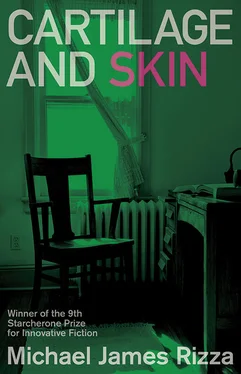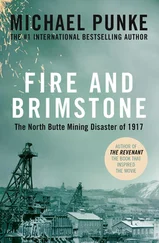Back in my apartment, I stripped out of my wet clothes, took a hot shower, and dressed myself in my robe. It was a light blue cotton garment that I’d purchased on a whim. Though a simple and common piece of clothing, it allowed me to imagine myself as luxuriating with the extravagance of a great poet. However, lacking a sweet-smelling pipe, laurels, and talent, not to mention an innate sense of ease, I probably more closely resembled a lonely housewife. After all, the robe had come from the women’s department of the Macy’s in Center City.
I made myself a cup of hot tea and sat at the kitchen table with my manuscript. As I was reading, my own words felt alien to me, both insincere and inane. I didn’t like that they were supposed to represent me and that, through them, Celeste Wilcox had formed judgments about me. My ideas had passed through her mind, which had sifted and measured me out. Even so, I couldn’t bring myself to destroy my work. It was enough for me simply to abandon my project and leave my computer files indefinitely closed. Anyway, my boring, pedantic exercise seemed to be no more than a formality at the college. Certain officious types were unquestionably bent on seeing me go through the customary motions. They had granted me leave, under the auspices of personal academic development and with the expectation of a final product — but, in return, I intended to give them nothing. I couldn’t have found a more effective way to jeopardize my position. Whenever I picked up my tea to take a sip, I absently set it back down upon the title page of my book, but always on a different spot, until the whole sheet was covered with rings from the cup. I figured I had several options open to me. The least likely was to confess that I didn’t satisfy my end of the agreement: There would be no book. Also, I could have stalled everyone, Morris included, and gone on pretending to be hard at work. Another possibility was to write something entirely different, although I doubted this would have appeased anyone, especially considering the rough ideas I had in mind. Discomfited by my situation, I started to feel a bit rash and vindictive. On the backside of a sheet from my manuscript, I briefly sketched the outline of a new book. Either the third or fourth chapter would focus on the power structures within a liberal arts education. Once again, as in my previous book, I would use a Hegelian model, arguing that power proper is empty of all meaning save for the sound of its own senseless fiat. Obviously, all the vacuous jibberings of the collective mass of supremely esoteric and distended specialists ultimately amounted to nothing, and the real position is not the ideas espoused by any particular modern day “-ism,” but the position of power. Of course, some people, professors in particular, think they’ve got something to say, and so they delude themselves and never quite realize (or confess) that they are merely props in a much larger play. Meanwhile, fresh “-isms” splinter off of older splinters, and a new specialist is created out of the very emptiness of his thinking because he has merely decided to become more specific and his investigation is not an expansion, but a fraction of a regress that is potentially infinite. He bounds himself in smaller and smaller shells and then counts himself a king of infinite space by virtue of the continual division and redivision of his domain. Thus, the entire schema — descending from Deans and theorists, to earnest teachers and students, and finally down to the un(formally)educated — would have four positions in relation to power: pure command without meaning; the delusion of having meaning; the quest for that meaning; and the ignorance, indifference, or resentment toward being outside the institution. Knowing all of this, I nonetheless remained an ostensible part of the institution — while, in actuality, I hovered outside the total schema, paring my fingernails.
Before I even finished my outline, I discarded the whole thing; it was too derivative and uninspired. I needed to think of another book, maybe even something creative. I could dig up my youthful passions and try to write a collection of poems, which was so far from what people expected of me that I would have been accused of full-blown lunacy. Regardless, I no longer cherished my obligations or my connections to the people who supposedly made up my professional and social circle. I was on my own. If I failed as a poet, then I would simply reweigh my options. Besides, other opportunities surely existed outside of my field. Considering my recent experiences with the boy, I imagined that there might have been a public interest in an exposé of the underground world of pedophilia. A man’s descent into that world was undoubtedly marked by a complete range of troubling emotions — as well as a series of risks and encounters, of fits and starts — that lowered him deeper and deeper. After all, how does a person go about finding partners in that particular crime? I suspected that most pedophilia rings weren’t a secret society; they were formed impromptu as the coveted object got passed from one man to another. What would be the code of conduct among such men? In all likelihood, the group would be organic, protean, perhaps centered upon a ringleader, perhaps raising up leaders out of chance, compromise, and the fluid travails of shifting circumstance. The difficulty in writing such a book would’ve been collecting information; the fullest report would’ve required the author himself to become a shade of the underground, a chronicler of his own descent. With this thought in mind, I gathered up the pages of my manuscript and dropped them in the trashcan. I washed my teacup in the sink and decided to try my hand at poetry.
VII
As the days grew colder with the onset of the winter months, I found myself frequenting coffee shops and bookstores. Squirreled away at a corner table, hunched over a marble-covered notebook, and drinking cup after cup of coffee, I went through various stages of self-revelation. My heart was more encrusted with pretense and guile than I ever expected. As I scraped away layers of calcified knots and nubs, I began to fear that beneath it all, there might not have been any core of purity to discover, any underground truth to express. But even if I didn’t doubt its existence, I knew that it would always resist exposure, for in the very act of trying to unearth it and drag it into the open, I would mar the delicate thing and smear it with my grimy fingers; all the while, in a process of its own, it would react to the violation by secreting cloudy juices, coating itself over again, adopting new, false labels. I had to settle for pretense and guile because there was nothing else. As I scribbled lines of doggerel in my notebook, I was mildly thrilled by my petty plunge into the realm of art, precisely because it came at the cost of defiance and spite. By rebelling against my peers and fellow pedants, I began to nurture a secret pleasure, such as a poacher must feel, squatting at the edge of his campfire light, chewing on stolen meat. Like him, I had for my tools silence, exile, and cunning. Unfortunately, I lacked talent.
I spent so much time in one particular bookstore that I started to suspect that the staff of high school students — who put more energy into flirting with one another than into making sure the tables were clean — began to regard me as a serious writer. I overheard a squat, happy girl say, “J. C. is in his corner again.”
Keeping my head down, I pretended to disregard the comment. I was curious how I’d acquired the nickname and when had they started calling me J. C. It seemed to be an implicit compliment; whether they regarded me as inspired and prophetic as Jesus Christ or perhaps as deranged and solipsistic as a false messiah, the students nonetheless saw that I possessed a glimmer of poetic lucidity — sacred or insane. From then on, every time I visited the counter for a free refill, I gave a slight smile to the girl or to whomever else was working. I felt a bit lofty. Despite never really talking to anyone, I felt a connection to the staff. I was friendly. One day when I got up to use the bathroom, I asked the squat girl if she could watch my books and my coat at the table.
Читать дальше












